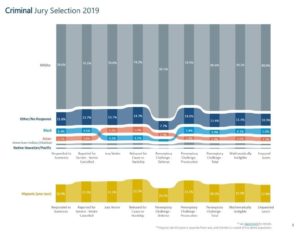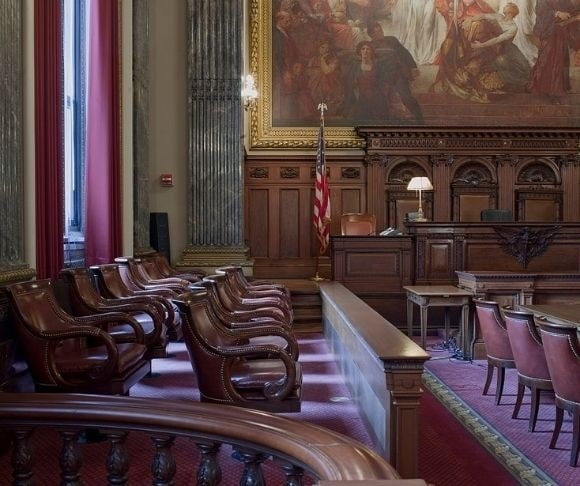The Arizona Supreme Court announced it is eliminating peremptory challenges in both civil and criminal trials. It’s the first state in the nation to do so. The practice allowed attorneys to remove a potential juror for any reason. Now jurors will only be dismissed for cause, such as knowledge of the case or bias toward a witness.
When attorneys pick a jury, they do so from the group of assembled prospective jurors, called a venire. The process of examining a juror is called voir dire, or, roughly, “speak the truth.” Jurors are required to submit themselves to this process, which may include answering questions about intimate details of their lives and their most dearly held beliefs. Attorneys may strike a juror if they object to the person being on the jury. Parties to a trial have unlimited strikes for cause, and that hasn’t changed. Often, however, there is a prospective juror that just isn’t quite right without clearly meeting a for-cause objection to seating them. Peremptory challenges were made for these folks.
Any Reason or No Reason, Just Not a Bad Reason
 The number of peremptory challenges fluctuates according to several factors, including and especially pre-trial publicity. For instance, Judge Peter Cahill of the George Floyd/Derek Chauvin trial started the proceedings giving the defense 15 peremptory challenges, while the prosecution got nine. In Arizona, the number depended on the severity of the crime for criminal juries. Attorneys can use a peremptory challenge for any reason, or no reason at all, but not race. Prosecutors dismissing black jurors especially bear the burden of showing a peremptory challenge they make against a black person is grounded in some compelling reason besides race.
The number of peremptory challenges fluctuates according to several factors, including and especially pre-trial publicity. For instance, Judge Peter Cahill of the George Floyd/Derek Chauvin trial started the proceedings giving the defense 15 peremptory challenges, while the prosecution got nine. In Arizona, the number depended on the severity of the crime for criminal juries. Attorneys can use a peremptory challenge for any reason, or no reason at all, but not race. Prosecutors dismissing black jurors especially bear the burden of showing a peremptory challenge they make against a black person is grounded in some compelling reason besides race.
Whenever a peremptory challenge is made, the opposing side can object to it, calling for a Batson hearing. The hearing was named for the 1986 Supreme Court case Batson v. Kentucky, which established that race alone was a forbidden reason to disqualify potential jurors. At a Batson hearing, the challenging party must show a prima facie case that the peremptory challenge was exercised based on race. If this step is satisfied to the judge’s satisfaction, the opponent then has the burden of offering a race-neutral explanation to rebut the prima facie case. If they can’t convince the judge, the juror will not be stricken.
Batson v. Kentucky
Mr. Batson was a black man convicted by an all-white jury. Those who advocate for eliminating peremptory challenges often do so from the position of supporting blacks, whom they claim are put upon by systematic racism. The state Supreme Court made the change after a study showed a vast racial disparity in jury strikes. Defense attorneys disproportionately struck white jurors, while prosecutors disproportionately struck black jurors in criminal cases.
 A look at a graph from the report “Racial and Ethnic Representation through the Jury Selection Process: An Analysis of 2019 Jury Data from the Superior Court of Arizona in Maricopa County” tells the tale.
A look at a graph from the report “Racial and Ethnic Representation through the Jury Selection Process: An Analysis of 2019 Jury Data from the Superior Court of Arizona in Maricopa County” tells the tale.
White people are just as likely to face a peremptory challenge from prosecutors or defense attorneys, at 2.9% and 2.8%, respectively. For blacks, the prosecutors’ challenge rate is 5.8%. Meanwhile, defense attorneys exercise so few peremptory challenges against black prospective jurors the number doesn’t even show on the chart. These data points indicate that prosecutors and defense counsel believe blacks are better for defense teams than plaintiffs and prosecutors.
The problem with creating rules based on statistical analysis is that individual justice is not addressed even if the data is accurate. Now no black or white defendant will enjoy the right to exclude people they know just don’t belong on their jury. This rule will stay in place until the Arizona Supreme Court changes it, if they desire, or if the United States Supreme Court does it for them. Just because the high court said race alone was impermissible in peremptory challenges doesn’t mean the U.S. Supreme Court agrees these challenges may be removed entirely. We should expect the first criminal convictions under jury trials with the new rules to appeal on those grounds, as well they should.
~
Read more from Scott D. Cosenza.




